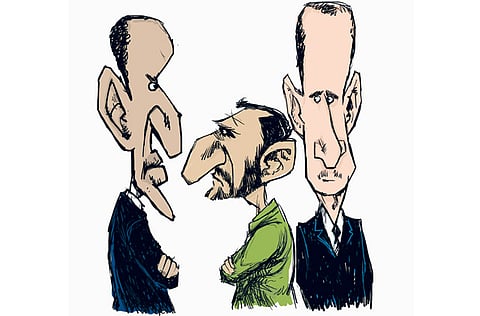US has problems with Iran, not Syria
Obama has extended the sanctions for another year, but this has little to do with Damascus

After a period of cautious optimism, US-Syria relations seem to have suffered a new setback. Saying Syria posed an "extraordinary threat" to US security, President Barack Obama on Monday declared an extension of sanctions on Syria for another year.
In a letter to Congress, Obama told lawmakers that he had decided that the sanctions on Syria, which were due to expire on May 11, would continue for another year. "Its actions and policies, including continuing support for terrorist organisations and pursuit of weapons of mass destruction and missile programmes, pose a continuing unusual and extraordinary threat to the national security, foreign policy, and economy of the United States," said Obama in the letter.
Given the recent tension in the relationship between the two countries, the renewal of sanctions was not in fact surprising. Last week, US Secretary of Defence Robert Gates accused Syria of arming the Lebanese resistance movement, Hezbollah, saying it gave the group sophisticated rockets and missiles. Gates fell short of completely embracing the Israeli allegations that Syria has supplied Hezbollah with Scud missiles. Two days later, similar accusations were made, but in a stronger manner, by Secretary of State Hillary Clinton. Speaking before the American Jewish Committee in Washington, Clinton said: "We have spoken out forcefully about the grave dangers of Syria's transfer of weapons to Hezbollah. We do not accept such provocative and destabilising behaviour — nor should the international community. President [Bashar Al Assad] is making decisions that could mean war or peace for the region".
This sort of hostile language made it almost certain that Obama would renew the sanctions against Syria. But why have US-Syrian relations turned sour again after a period of tranquillity? To answer this question we need to look at why these sanctions were imposed on Syria in the first place.
For years now, US officials have been accusing Syria of all sorts of things, including allowing foreign insurgents to cross the border into Iraq, supporting Palestinian and Lebanese militants, and continued meddling in Lebanese affairs. The emphasis has always been on Syria changing its regional policies and going along with the US strategy for the Middle East. And when the Syria accountability Act was passed by the US Congress in 2003, the US government put three conditions in place that would have to be met before the pressure on Syria would be eased.
Compliance
In fact, there have since been remarkable changes in Syrian foreign policy. The Syrian government withdrew its troops from Lebanon, ending three decades of military presence, a step towards fulfilling one of the three conditions of the Syria Accountability Act. Syria has also reinforced its military presence on the Iraqi border, deploying some 7,000 extra troops to stop would-be infiltrators seeking to join the anti-American insurgency, a step towards fulfilling another condition. For this, Syria was complimented by US officials, who acknowledged that infiltration had become less of a problem. In addition, as a mark of good faith, Damascus allowed Iraqi candidates for the legislative elections to campaign among Syria's Iraqi community. All of the above represented a clear departure from the original Syrian policy, which opposed the US invasion and everything resulting from it.
Syria also seems to be playing a more positive role in the Palestinian reconciliation process. In recent months, Damascus has tried to broker reconciliation meetings between Palestinian National Authority President Mahmoud Abbas and Palestinian groups based in Damascus. Furthermore, Syria has repeatedly stated that it would accept any decision taken by the Palestinian National Authority regarding a final status agreement with Israel.
Despite Damascus having satisfied most of the conditions of the Syria Accountability Act, Washington seems unimpressed. It apparently wants to see more than just localised, surgical changes in Syrian foreign policy. Perhaps it wants to transform Syria into a "client state" that helps to achieve far-reaching US interests in the region. Above all, Washington seeks to break the Syrian-Iranian alliance. In Washington, Iran is considered the big fish. From the US point of view, something should be done to circumscribe Tehran's increasing regional influence; it must be either won over or further isolated. That was clearly the undeclared objective of several US officials who visited Damascus in recent months. They left empty handed, however.
It has become absolutely clear that US-Syrian relations are tied up to US-Iranian developments. This explains why neither Washington nor Damascus have been willing or able to deliver what the other wanted. The only important result of the Obama administration's engagement with Damascus has been that the two sides discovered that all roads lead to Tehran.
- Dr Marwan Al Kabalan is a lecturer at the Centre for Strategic Studies and Research at Damascus University in Syria.



